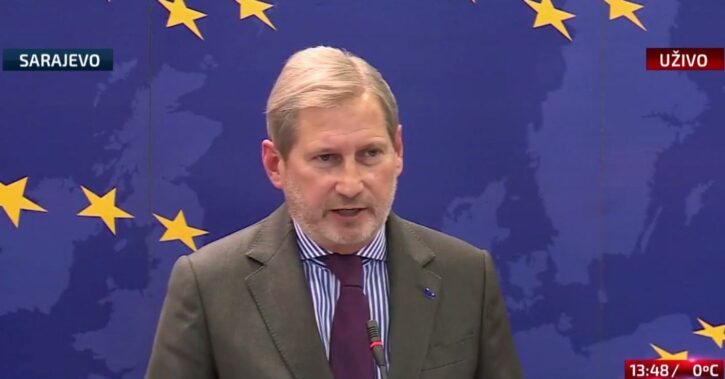
Either the EU will stabilise the Balkans or the Balkans will destabilise the EU, the Union’s Commissioner for Neighbourhood Policy and Enlargement Negotiations, Johannes Hahn, told N1 on Saturday in an interview in Davos, Switzerland.
“The motive I am lead by in the neighbourhood policy, which also applies to candidate countries in the Balkans, is – either we, as the EU, export stability, or we import instability,” Hahn said.
Sustainable peace, economic and social progress and reconciliation is only possible when all six Balkan countries that are still not member states have a European perspective, he said, adding that both those countries and the EU profit from that.
When and how those countries will join the Union is up to them and “Every country has a key to the EU and can use it,” Hahn said.
The EU has published its Balkan strategy last February, he said, “where we have clearly concluded that any new candidate can only become a member when it solves its bilateral conflicts.”
Concrete negotiations between Montenegro and Serbia and the EU are ongoing, but “that does not mean that those countries are the first to reach the finish line.”
“There is no speed limit, but the changes need to be sustainable,” he said, exemplifying the fight against corruption, developing the rule of law and economic development and saying that “this all takes time.”
Hahn said that a lot of progress has been made in the Balkans, listing the Macedonian name deal that is waiting to be ratified in Athens as well as positive steps made by Albania.
When asked if the EU had failed in the negotiation process between Serbia and Kosovo, when Pristina’s 100 per cent tariffs on Serbian products are taken into account, Hahn said that even with this taken into account, “the relationship has improved.”
“We had various developments throughout the past months that would have possibly lead to an armed conflict in the past,” he said. “Today, those responsible, the presidents, grab the phone and call each other.”
There are some setbacks every now and then but those should not be discouraging, he said, naming the Pristina tariffs as one of them. The issue must be solved, and Hahn said he proposed that any trade issues between Serbia and Kosovo should be discussed separately, and expressed readiness to facilitate the negotiations.
He said he spoke to Vucic and Thaci on Friday in Davos, and that it seems both of them agree they need to sit “at one table” and negotiate and clear up problems such as the tariff issue in order to continue the overall dialogue on the relationship between them.
“I am convinced that we will resolve this, and it is expected that already in the late winter the dialogue can still be continued,” he said.
The Serbian President said recently that he was not happy with the tariffs Brussels has set for steel coming from Serbia, and Hahn explained why the move was made.
“The factory that produces steel in Serbia is owned by China,” he explained, and the EU had to, “based on the measures the US introduced to China,” impose certain protection measures so there is no disproportionate import of steel into the EU, which could disturb its market.
“We have discussed this without friends in Serbia and I believe we have found a solution that fits our interests but also leaves a possibility to our Serbian colleagues to react accordingly,” he said, adding that he does not expect the issue to cause any problems.
“For us, it is important that steel is not imported into the EU via other countries,” he said.
Serbia was criticised for its bad record on media freedom and Vucic said in Davos that his country will do everything it can to improve it.
“The issue of media freedom and media pluralism is a constant in our assessment of the development of the country (…) Some things take time, but they have to be done, and he (Vucic) is aware of it,” Hahn said.
Politicians not only in Serbia but also in other countries should “in their speaking, hold back,” and make sure their speeches do not invite others to commit violence against journalists, he said.




